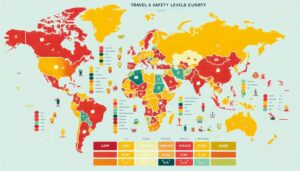In this fast-paced era, mobile notary services have become a highly sought-after solution for many people. However, along with the convenience offered, questions arise about additional costs known as “travel fees”. This article will thoroughly explore everything you need to know about mobile notary travel fees, from both client and notary perspectives.
1. Introduction to Mobile Notary
1.1 What is a Mobile Notary?
A mobile notary is an “on-the-go” notary service where notaries are willing to come to the client’s location to perform document authentication or other notary services. Just imagine, you don’t have to bother leaving your home or office just to get a notary signature. Cool, right?
1.2 Advantages of Mobile Notary Services
Now, why are people so into this mobile notary service? The answer is simple: flexibility and time efficiency. Try to imagine, you’re busy managing an important project at the office, suddenly you need a notary signature ASAP. Instead of going back and forth to the notary office, the mobile notary can come directly to you. Super practical!
2. Understanding Travel Fees in the Context of Mobile Notary
2.1 Definition of Travel Fees
Okay, now we’re getting to the core issue. What exactly are travel fees? Simply put, these are additional fees charged by notaries to cover their travel expenses to the client’s location. So, in addition to standard notary service fees, there’s a “ride fee” of sorts.
2.2 Components of Travel Costs
Now, these travel fees aren’t just about gas, you know. There are many components that go into the calculation:
- Gas or public transportation costs
- Time spent on the road (remember, time is money!)
- Parking fees (if going to malls or office buildings)
- Vehicle depreciation (yep, this is also taken into account)
- Additional insurance (because the risk on the road is higher)
So, if you later see the cost breakdown and it’s a bit ‘wow’, just remember the components above, okay?
3. Factors Influencing Travel Fees

3.1 Travel Distance
This is obvious, the further the distance, the higher the travel fees. But it’s not always linear. Sometimes there are notaries who give “discounts” for long distances because they can serve other clients in the same area.
3.2 Location and Accessibility
Now, this is what often makes things tricky. Hard-to-reach locations can inflate travel fees. For example, a client living in a 20th-floor apartment without a functioning elevator. Can you imagine how exhausting it is for the notary? Or locations in remote areas with dirt and rocky roads. Well, accessibility is an important consideration.
3.3 Service Time and Day
Don’t be surprised if you request services outside working hours or on weekends, the travel fees might increase. It’s overtime, after all, there must be compensation. Especially if you request on public holidays or national holidays, be prepared for your wallet to feel a bit lighter.
3.4 Fuel Prices and Operational Costs
This is what can make travel fees fluctuate. When fuel prices rise, travel fees automatically follow suit. Not to mention inflation that makes operational costs higher. So, if suddenly the travel fees increase, don’t immediately accuse the notary of being greedy.
4. Travel Fees Pricing Structure
4.1 Flat Rate Calculation Model
Some notaries use a flat rate system. So, they’ve set one price for a certain area. For example, for the entire South Jakarta area, the travel fee is a flat $20. Nice, it makes it easy for clients to calculate their budget.
4.2 Per Kilometer Calculation Model
Now, this one is more detailed. Travel fees are calculated based on the distance traveled. For example, $0.50 per kilometer. So if the distance is 20 km, the travel fee is $10. It’s fairer, but sometimes makes clients think twice if the location is far.
4.3 Zone-Based Calculation Model
This model is like a combination of the two previous models. The city is divided into several zones, and each zone has its own rate. For example, zone 1 (0-5 km) $5, zone 2 (5-10 km) $10, and so on. Quite fair and easy to understand.
5. Tips for Saving on Travel Fees as a Client

5.1 Proper Time Planning
Want to save on travel fees? Try planning the time properly. Try to order services during normal working hours and avoid weekends or holidays. Also, if possible, book well in advance so the notary can arrange an efficient route.
5.2 Combining Multiple Services
Now, here’s the winning trick! If you indeed need several notary services, it’s better to combine them into one visit. For example, document legalization along with a power of attorney. That way, you only pay travel fees once. Not bad for saving some extra cash, right?
6. Notary Perspective: Determining Fair Travel Fees
6.1 Operational Cost Analysis
For notaries out there, it’s really important to carefully analyze operational costs. Don’t just pluck numbers out of thin air. Calculate all components, from gas, time on the road, to vehicle depreciation. That way, the travel fees set will be more reasonable and justifiable.
6.2 Considering Market Factors
Besides calculating costs, it’s also important to check market prices. Try surveying other notaries’ travel fees in the same area. Don’t let our prices be too far from competitors, or it might drive clients away. But also don’t be too cheap, or you might end up losing money. The key is to find the sweet spot that works for both the business and clients.
7. Regulations and Ethics Related to Travel Fees
7.1 Government Regulations on Notary Fees
Don’t think notaries can set travel fees as they please. There are government regulations that govern this. Usually, there’s a maximum limit that can be charged. So, both notaries and clients should be aware of these rules to avoid feeling cheated.
7.2 Transparency in Fee Determination
Now, this is the most important thing. Transparency is key. Notaries must explain the cost breakdown to clients, including travel fees. There shouldn’t be any hidden costs that surprise clients when paying. For clients too, don’t be shy to ask for cost details. It’s about finding fairness, so it should be an open book.
8. Future Trends in Mobile Notary and Their Implications on Travel Fees
8.1 Technology and Travel Efficiency
Times are getting more advanced, bro! With more accurate navigation apps, notaries can arrange routes more efficiently. Not to mention electric vehicles that can reduce operational costs. In the future, this could make travel fees more affordable. Who knows, right?
8.2 Post-Pandemic Work Pattern Changes
The pandemic has changed many things, including how notaries work. Many have started using a hybrid system, combining online and offline services. This could affect the structure of travel fees in the future. There might be new, more flexible models. Clearly, both notaries and clients must be ready to adapt.
9. Conclusion
Well, we’ve reached the end of the article. The point is, mobile notary travel fees aren’t as simple as we thought. There are many influencing factors, and both sides – notaries and clients – play important roles in determining fair fees.
For clients, it’s crucial to understand the components of travel fees and how to save on them. While for notaries, transparency and accurate calculations are key to keeping clients satisfied and business running.
Certainly, with the development of technology and changes in work patterns, we can hope that travel fees will become more efficient and affordable in the future. But still, good communication between notaries and clients is the most important thing. That way, all parties can be equally happy!
10. FAQ About Mobile Notary Travel Fees
- Q: What’s the difference between travel fees and notary service fees?
A: Travel fees are additional costs specifically for the notary’s travel to the client’s location, while notary service fees are for the notary service itself. So, think of travel fees as the notary’s “ride fare”. - Q: Is it okay to refuse to pay travel fees?
A: Oh no, don’t do that! Travel fees are part of the mobile notary service. If you don’t want to pay, it’s better to just go to the notary’s office directly. But remember, time and travel costs become your own responsibility then. - Q: How do I know if the travel fees requested by the notary are reasonable?
A: Try comparing prices from several notaries in the same area. If there’s one that’s too high or too low, just ask for the reason. The important thing is to make sure all cost details are clear and transparent. - Q: Can travel fees be negotiated?
A: It’s possible, but remember that notaries have their own calculations. Try to negotiate politely, you might get a better price. But don’t force it, they’re professionals after all, and have surely calculated carefully. - Q: If the notary is late due to traffic, can the travel fees be reduced?
A: Well, this depends on each notary’s policy. Some might give compensation, others might not. The important thing is to communicate it well. If the delay is really bad, it’s reasonable to ask for consideration about the fees.






